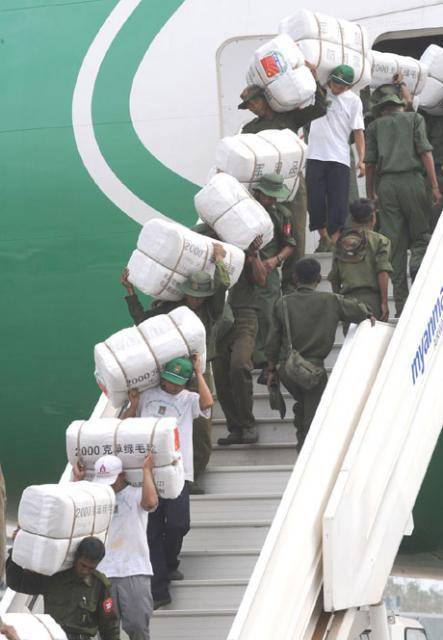PATHEIN, Myanmar - Myanmar held a national referendum Saturday despite warnings that more people would die unless the government focussed on delivering emergency aid for survivors of last week's cyclone. In surreal scenes, voting booths were erected close to makeshift camps for the homeless, and the country's military regime continued to hold up tonnes of urgent relief supplies at the airport. The junta, deeply suspicious of the outside world, has refused to let in foreign experts who specialise in getting aid to disaster victims, and said that only the government would be allowed to distribute emergency supplies. But the United Nations said that even the aid itself was being held up by the regime, strangled by customs and red-tape as the country went ahead with a vote whose only goal, critics say, is to cement the regime's hold on power. "It's a race against time," said Richard Horsey, a spokesman for the emergency relief arm of the United Nations. He said only one-quarter of the neediest victims of Cyclone Nargis had received any kind of aid one week after the tragedy, which left 60,000 people dead or missing and as many as two million more short of food, water and supplies. Some aid has been distributed, but more people could die of disease or starvation unless they get help soon. At least one planeload of food is stuck at the airport, not yet cleared for release. "We're dealing with lots of bureaucracy, we're dealing with a lot of red tape, and possibly we're dealing with an environment where the authorities aren't fully open to a relief effort of this kind," Horsey said. "That's very frustrating." The UN refugee agency said its first aid convoy had arrived by land over the Thai border, but it was to be unloaded on to Myanmar trucks and it was not clear who would distribute the supplies including tents and tarpaulins. "We're hoping that the authorities will keep their word and give us access to monitor the distribution of these materials," spokeswoman Vivian Tan told AFP in the border town of Mae Sot. Ignoring calls to put off Saturday's vote and focus on saving lives, the government went ahead with the referendum on a new constitution in all but the worst-affected areas which will vote later in the month. The regime says the vote is a key step in its much-criticised "road map" to democracy and will lead the country, formerly known as Burma, to national elections within two years. But the last time there was a national ballot, in 1990, democracy activist Aung San Suu Kyi won in a landslide. She was never allowed to rule, and instead has been under house arrest for much of the time since. Among its provisions, the constitution would forever make it illegal for her to lead the country. The regime, which has long scorned the opinion of the international community, has tried to mobilise the people to vote in favour of the constitution. As it has for days, state television Saturday broadcast patriotic songs urging people to approve the charter, alternating with images of planes unloading food and military officers handing it out to the grateful poor. But the reality on the ground is sharply at odds with the government propaganda. Many survivors of the cyclone, which hit last Saturday, say they have nothing to eat or drink. Their villages have been washed away, many of their relatives are dead and their fury at the government is at fever pitch. In the trading town of Pathein, on the edge of the Irrawaddy delta where ramshackle villages bore the brunt of the destruction, a voting booth was set up just down the street from a camp for the homeless. "Many of the residents here feel so angry at the government when we see victims of the storm coming to our town," one teashop owner said. "People are not that interested in voting. What we care about is the storm victims," he told AFP. "Many of them are disgusted with the government. It has been so slow to help."
Saturday, April 20, 2024
Myanmar holds vote despite cyclone devastation

Heavy rains claim 98 lives, 89 injuries, across Pakistan: NDMA
1:21 PM | April 20, 2024
Watercourse project to help increase crop yields in Punjab
12:57 PM | April 20, 2024
Justice Ishtiaq Ibrahim sworn in as PHC chief justice
12:54 PM | April 20, 2024
Policitising Tragedy
April 20, 2024
Tehran to Rafah
April 20, 2024
A New Leaf
April 20, 2024
A Tense Neighbourhood
April 19, 2024
Dubai Underwater
April 19, 2024
Dangers of Deepfakes
April 20, 2024
Feudalism
April 20, 2024
Kite tragedy
April 19, 2024
Discipline dilemma
April 19, 2024
Urgent plea
April 19, 2024
ePaper - Nawaiwaqt
Advertisement
Nawaiwaqt Group | Copyright © 2024





